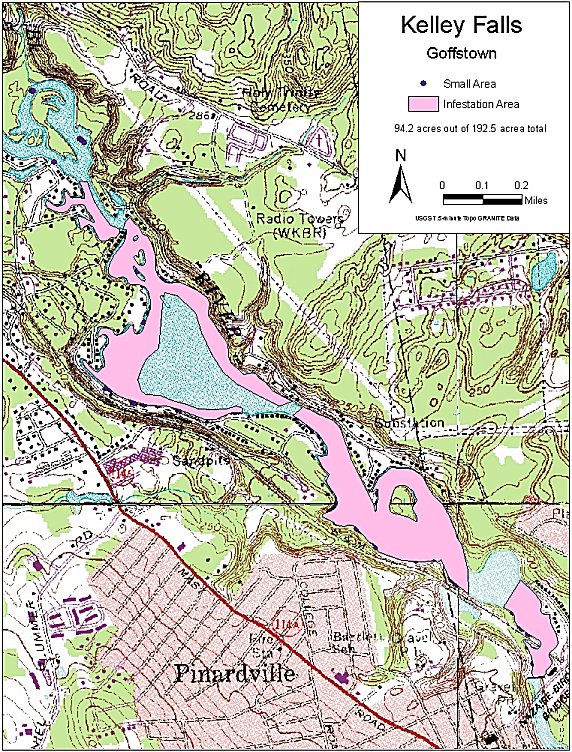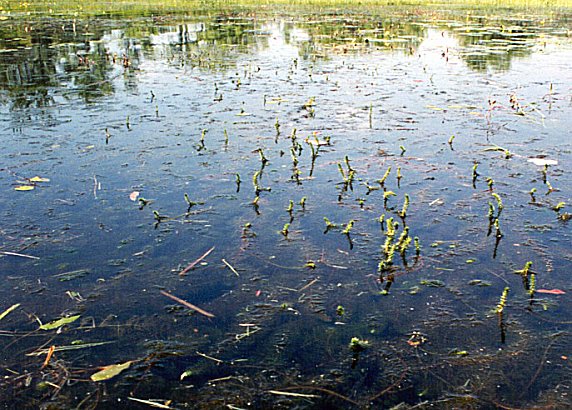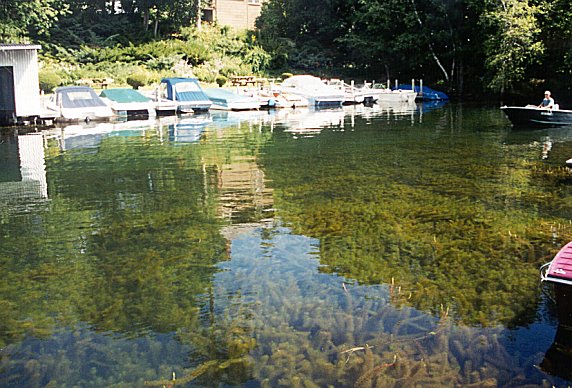Goffstown Residents Association chairman Guy Caron took his nephew, Sam, hornpout fishing in Glen Lake one night last week. While fishing various locations in the lake that night, they found heavy concentrations of milfoil weed everywhere. "We need to get something done about it immediately or it will only get worse, and that’s not good at all," Guy informed me.
It wasn’t but a few days later that the New Hampshire Union Leader came out with an article on Goffstown’s milfoil situation on Namaske Lake, in the Piscataquog River. The article said that half of the 194 acre lake is coated with milfoil and has the worst case of milfoil infestation in the state. Amy Smagula, a limnologist and exotic species program coordinator for the Department of Environmental Services said, "The milfoil, which generally is found in shallower areas, has grown to the maximum extent possible in Namaske Lake, which exists where the Piscataquog River backs up to the Kelly Falls Dam. Part of this lake, which is owned by the state, borders properties in Manchester."

2007 map of milfoil on Namaske Lake
Smagula further commented, "Milfoil grows 10 to 15 feet tall, raising to the surface in Namaske Lake. It can clog the engines of motor boats and makes it dangerous to swim because it is so thick. In other states, people have drowned in milfoil infested waters. Picture a corn crop under water more or less. It is literally an aquatic jungle." Amy Smagula told Goffstown selectmen that we are never going to be milfoil free in that lake at this point because there is always going to be a little bit of persistent milfoil within the Piscataquog River system. The severity of the milfoil situation was noted by Michael Allard, who resides by Namaske Lake, two years ago and he contacted the state immediately concerning the problem. Milfoil weed is known to severely harm aquatic life by blocking out the sunlight and depriving the waters of oxygen, causing fish to suffocate. Negotiations are currently underway to deal with the milfoil problem at Namaske Lake, and hopefully Glen Lake, too.

Milfoil on Massabesic Lake,
Manchester/Auburn
This invasion by milfoil, and other invasive aquatic forms, has no doubt been going on for many years. But, much of the problem of its getting out of hand is a good part the fault of careless and/or uncaring boaters who use these waters. As boaters, kayakers, anglers, etc., we need to
take more responsibility in order to help keep "aquatic hitchhikers", like variable milfoil, from spreading to and threatening the quality of our lakes, ponds and rivers. Milfoil can quickly take over, choking waterways with explosive growth, fouling intake and discharge structures, harming native plants, animals and killing our fish, as well as the possibility of lowering lakefront property values. Once established, as they now are in Goffstown waters, aquatic nuisance species are nearly impossible to eradicate. Jody Conner, Director of the Department of Environmental Services Limnology Center said, "There is no question that milfoil is one of the greatest threats to the quality of New Hampshire’s lakes, ponds and waterways."

Milfoil on Squam Lake
So, what can we do to help prevent the spread of milfoil in our waters? Here are some tips to help prevent the spread of milfoil and other exotic species:
- Before launching, look for "warning signs" for exotic species near the boat launch site. Check your boat, motor and trailer thoroughly and remove any and all signs of weeds that may
be present.
- Hand remove all materials (plant or animal) from your equipment. Don’t throw the material back into the water! Dispose of it all far away from the water. Pay special attention to the bunks or rollers where the boat is seated on the trailer.
- Wash and dry all equipment before re-use, including fishing rods, anchors and depth finder transducer units. Hose off your boat, canoe, kayak, diving gear or trailer.
- Drain and flush the engine cooling system and live wells of your boat, your bait buckets and the buoyancy control device from diving equipment that has been in contact with an infested waterbody (to protect against the spread of zebra mussels).
- Help spread the word. Know what you tote. For a list of exotic aquatic species that are regulated within the state of New Hampshire, visit the website:
www.des.state.nh.us/wmb/exoticspecies.
Lastly, be aware of other boaters launching and ask them to check their craft and be sure to remove any aquatic weeds that may be on their boat, motor or trailer. New Hampshire has a "Lake Host" program where volunteers are specifically trained in identifying aquatic invasive species, like milfoil, and how to deal with them. They provide courtesy inspections and help
educate boaters on how to prevent the spread of exotic species like milfoil at more than 40 lakes throughout the state. Everyone needs to be concerned and do their part. Perhaps it would be a good thing if Glen and Namaske Lakes had a "Lake Host" program at their launch sites during the season. It seems few people check their crafts at the launch sites, before launching and when coming out when they are done on the water.
RELATED ARTICLES
• Worse milfoil in NH: Namaske Lake
|



